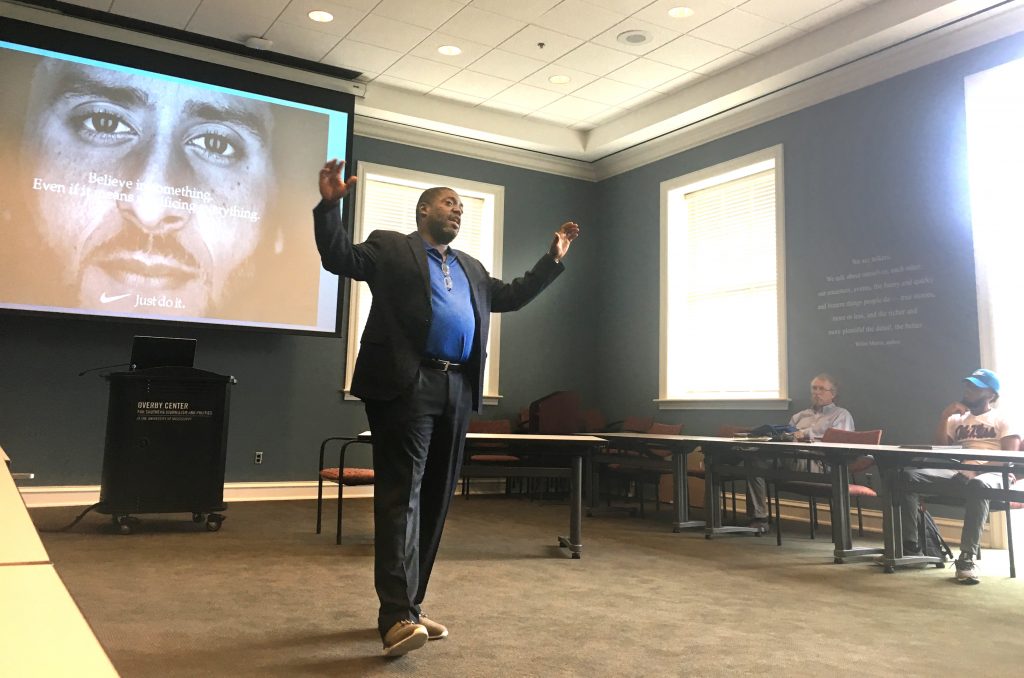Regular season NFL football returned this week and so did the widespread controversy surrounding players’ right to protest.
A Nike promo released Monday for the 30th anniversary of the “Just Do It” campaign featured former San Francisco 49ers quarterback Colin Kaepernick calling on viewers to “Believe in something. Even if it means sacrificing everything.” This has reignited the national conversation about players kneeling or otherwise protesting during the pre-game national anthem. However, before Kaepernick tweeted an image of Nike’s new ad on Monday afternoon, professor Charles Ross was already preparing to lead a lunchtime talk on campus about race, society and professional football.

Professor Charles Ross lectures on the role of protests in professional football in the Overby Center on Wednesday. The Ole Miss Center for the Study of Southern Culture hosted the discussion. Photo by Slade Rand
Ross, director of African American studies and a professor of history, began the Center for the Study of Southern Culture’s weekly Brown Bag Lunch and Lecture series on Wednesday with a discussion titled “Protests in Football.”
“One of the reasons I study sports is that sports illustrate a lot of aspects of human behavior,” Ross said.
Ross originally planned to tell the story of how a group of black players forced the American Football League to move its 1965 All-Star game from New Orleans to Houston, but Nike’s new ad prompted him to rework the lecture. By the time Wednesday’s Brown Bag Lunch arrived, Ross had pulled together a new presentation taking a look at how Kaepernick’s experience resembles that of the 21 players who boycotted the AFL in 1965.
“Some 50 years before Colin Kaepernick took a knee in protest of police brutality and continued racial discrimination in America, black AFL All-Stars had successfully challenged racism in the city of New Orleans,” Ross said.
The group of AFL players who boycotted the league’s All-Star game in 1965 did so for reasons similar to those that led Kaepernick to take his first knee in 2016. Those 21 players voted to boycott after their experiences with discrimination and mistreatment peaked upon their arrival in New Orleans for the All-Star game in January 1965. Ross said that many black players struggled to find desegregated restaurants in town at which they could eat and that others were berated with racial slurs while walking around the French Quarter.
Ross also pointed out that the 20-something-year-old players behind the All-Star game protest were around the same age as Emmett Till at the time of his murder in 1955. Ross said these players’ reactions to Till’s murder likely played a role in their decision to protest, much like the deaths of young, unarmed black men at the hands of police motivated Kaepernick to take his knee.
“Both protests are, arguably, linked by the historical events that provided the context and rationale for the participants to take the action that they did,” Ross said.
He said protests from within the sporting world garner heightened public attention because of the boundary-breaking nature of sports themselves. Ross said fans and players often leave their social, ethnic and cultural differences at the door when it comes to attending sporting events together.
“Sports kind of brings people together where you aren’t really that bothered by those differences … during those couple of hours,” Ross said.
Ross said he expects these sorts of on-field protests to continue throughout this NFL season and hopes the discussion around them becomes less divisive.
“Hopefully — maybe at some point — we’ll come on back around to what the original issue is: We need to figure out a way to come together and deal with many of the issues that divide us as citizens in this country,” Ross said.
The Center for the Study of Southern Culture has sponsored its Brown Bag series since the 1980s, according to director Ted Ownby. He said the Southern studies department hosts these discussions over lunch to encourage students with busy schedules to attend without having to miss out on grabbing lunch.
“It becomes kind of an easy way for people to stop and hear something smart without having to break up the rest of the day,” Ownby said.
He said this fall’s series will focus on “Sports in the South,” with conversations about golf’s desegregation and the history of wrestling in the South scheduled for later this month.
“We didn’t realize there would be such an immediate relevance when we scheduled (Wednesday’s) talk,” Ownby said.
Ownby said that the series’ focus on sports is intended to draw in students who might not have been as interested in the topics of past Brown Bag Lunches.
“I’m hoping people would say, ‘Let’s think about how to study (sports and society),’ or (say), ‘Let’s think about what those have in common,’ when they don’t seem to have a lot in common,” Ownby said.






